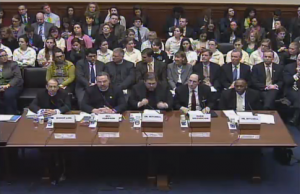 On Facebook and even email, this picture meets me at every turn, looming, vaguely Inquisitorial. You want to explain to us why you *need* birth control, young lady? Depressed by the image and its context — and by work and other First World Problems, despite even-more-stellar-than-usual moments of conversation with students — I turned to a little mini-video-wake for one of the stars of my adolescence. It did, and didn’t, help.
On Facebook and even email, this picture meets me at every turn, looming, vaguely Inquisitorial. You want to explain to us why you *need* birth control, young lady? Depressed by the image and its context — and by work and other First World Problems, despite even-more-stellar-than-usual moments of conversation with students — I turned to a little mini-video-wake for one of the stars of my adolescence. It did, and didn’t, help.
Strange to admit that although I had heard this song a million times, ricocheting out of my mom’s station wagon radio between junior high school days and errands — worming deep into my ear, even then, with its particular balance of glossy pop yearnings — I had never seen the video till now. Ours was not an MTV household; out in the county, we didn’t have cable till 1989, and my only peek at MTV in its mid-eighties heyday was a fascinated glimpse of the videos for “When Doves Cry” and “She-Bop” in my best friend Beth’s basement. Still, I heard something in Whitney Houston’s voice that every little girl of that era must have heard as well: despite its dizzying, soaring gleam, despite her cheerleader beauty, there was something there as vulnerable as me.
When I see this video now, at thirty-seven, I see a glowing girl trying to weave an increasingly anxious path through a world full of walls — scrims that tempt with bright colors and illusions, barriers and judging, blocking voices and faces in black we obey and turn aside from for reasons we can’t name. We want to be good, to keep up our bright bouncy song and the lithe undaunted spring in our step and whatever self-belief we can muster. But we can’t dismiss the questions: how will I know? If he really loves me? If I am pretty enough, slender enough, talented enough, working hard enough, being all I should be to get his approval, or anyone’s? Because the judges are in the maze with us, working through it busily as ants, always ready to line up in a panel and frown: well, young lady?
 I think a lot about how to keep moving forward in a world that will pinch down any manifestation of spirit and heart into tiny corners if we let it: through real dangers, and gut-wrenching oppressions of which even we privileged Americans can’t help but be aware, and the thousand natural shocks that flesh is heir to. I think about it a lot.
I think a lot about how to keep moving forward in a world that will pinch down any manifestation of spirit and heart into tiny corners if we let it: through real dangers, and gut-wrenching oppressions of which even we privileged Americans can’t help but be aware, and the thousand natural shocks that flesh is heir to. I think about it a lot.
And every morning, as I make progress in big ways and small on my novel, I find again that what moves me forward is art. Every day, we can find a way to do or make or say even one small thing that gives us joy. This disseminates spirit in whatever life-giving form it may be present with us that day on out to other people, and we never know where the ripples may stop. Which little girl in Alabama might be listening on her mama’s radio. Which boy at the back of the class who seems not to be listening is actually taking in every single word.
In creative writing class this week we pondered Caravaggio’s consciousness of flesh in “The Sacrifice of Isaac” — the second version in particular, the thumb pressed into that straining cheek — and then how we might get that same sense of beastly, creaturely reality, weight, and presence into our own writing. What better way than to study some actual beasts?
Robert Sartore, “Field Test: Biodiversity”
“Ok, y’all,” I said, after we’d talked about a great sensory poem or two, then watched this short film a couple times through and jotted verbs or images as they occurred, “let’s all be the animals, in our own motions. The lights are off and the blinds are shut, because we’ve already been watching this film, and everybody else will be doing it, including me. So you don’t have to feel self-conscious.” With much awkward laughter but immediate and palpable excitement, students shucked off their shoes and dove to the floor — even more eagerly than I’d expected — to be first the curling and uncurling armadillo, then the owl with its swiveling head; even the shyest among us waved our arms like the graceful black unfurling of snake. I will never forget the mood of happiness and release and playfulness, the wide and open smiles on their faces, including mine. Or the burst of scribbling released on return to our seats, or the comment after comment from students as they left, or as I ran into them later that afternoon: “thank you so much! that was awesome! I really get it now, embodiment, concreteness, getting into your writing how it feels…” Or what I blurted out involuntarily, in response to them: “I just feel so happy.”
Surely this must be not just a stay but a firm and loving pushback against despair: to be here, in our flawed and glorious bodies, in this world with all its invisible barriers and walls that try to contain them. To own them, and their gifts, on our own terms. And to sing our songs as clearly as we can, knowing that this time tomorrow or next week or next month, if we keep after it and keep on nudging upward in any way we can, we can be a little brighter, a little louder, a little more ourselves at our very creaturely and human best.
